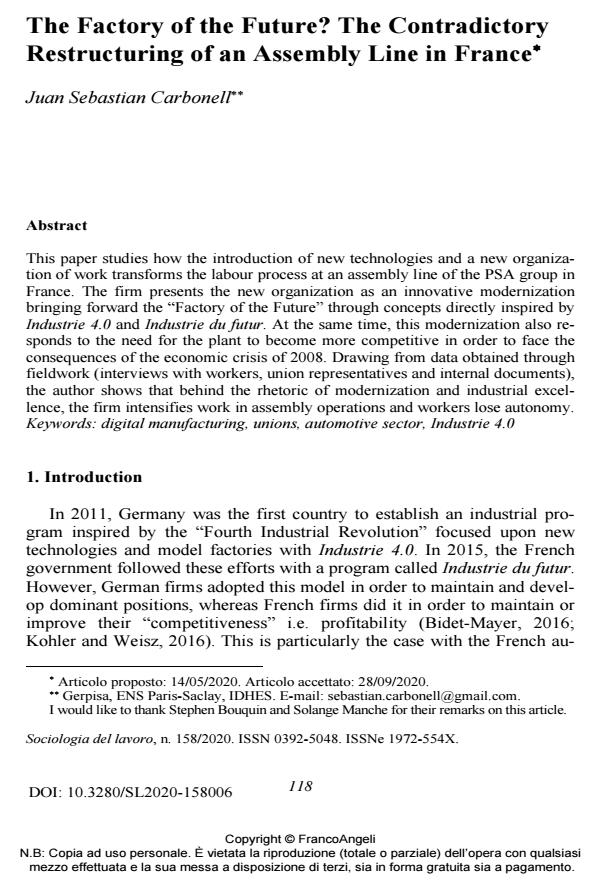The Factory of the Future? The Contradictory Restructuring of an Assembly Line in France
Titolo Rivista SOCIOLOGIA DEL LAVORO
Autori/Curatori Juan Sebastian Carbonell
Anno di pubblicazione 2020 Fascicolo 2020/158
Lingua Inglese Numero pagine 19 P. 118-136 Dimensione file 254 KB
DOI 10.3280/SL2020-158006
Il DOI è il codice a barre della proprietà intellettuale: per saperne di più
clicca qui
Qui sotto puoi vedere in anteprima la prima pagina di questo articolo.
Se questo articolo ti interessa, lo puoi acquistare (e scaricare in formato pdf) seguendo le facili indicazioni per acquistare il download credit. Acquista Download Credits per scaricare questo Articolo in formato PDF

FrancoAngeli è membro della Publishers International Linking Association, Inc (PILA), associazione indipendente e non profit per facilitare (attraverso i servizi tecnologici implementati da CrossRef.org) l’accesso degli studiosi ai contenuti digitali nelle pubblicazioni professionali e scientifiche.
This paper studies how the introduction of new technologies and a new organiza-tion of work transforms the labour process at an assembly line of the PSA group in France. The firm presents the new organization as an innovative modernization bringing forward the “Factory of the Future” through concepts directly inspired by Industrie 4.0 and Industrie du futur. At the same time, this modernization also re-sponds to the need for the plant to become more competitive in order to face the consequences of the economic crisis of 2008. Drawing from data obtained through fieldwork (interviews with workers, union representatives and internal documents), the author shows that behind the rhetoric of modernization and industrial excel-lence, the firm intensifies work in assembly operations and workers lose autono-my.
Questo contributo studia come l’introduzione di nuove tecnologie e una nuova organizzazione del lavoro abbiano trasformato il processo produttivo in una catena di montaggio del gruppo PSA in Francia. L’azienda presenta la nuova organizzazione come una modernizzazione innovativa che permette di portare avanti la “Fabbrica del futuro”, attraverso concetti direttamente ispirati a Industria 4.0 e Industrie du futur. Allo stesso tempo, questa modernizzazione risponde anche all’esigenza di una maggiore competitività dell’impianto per far fronte alle conseguenze della crisi economica del 2008. Attingendo ai dati ottenuti attraverso il lavoro sul campo (interviste con lavoratori e rappresentanti sindacali, analisi di documenti interni), l'autore mostra che, dietro la retorica della modernizzazione e dell’eccellenza industriale, l’azienda intensifica il lavoro nelle operazioni di assemblaggio minacciando l’autonomia degli operatori.
Parole chiave:Digital manufacturing, sindacati, industria automobilistica, Industria 4.0
- Que sait‐on du travail ? pp.561 (ISBN:9782724641905)
- Making digitalization work: unveiling digitalization's implications on psycho-social risks at work Rocco Palumbo, Elena Casprini, Raffaella Montera, in Total Quality Management & Business Excellence /2022 pp.1
DOI: 10.1080/14783363.2022.2055458
Juan Sebastian Carbonell, The Factory of the Future? The Contradictory Restructuring of an Assembly Line in France in "SOCIOLOGIA DEL LAVORO " 158/2020, pp 118-136, DOI: 10.3280/SL2020-158006